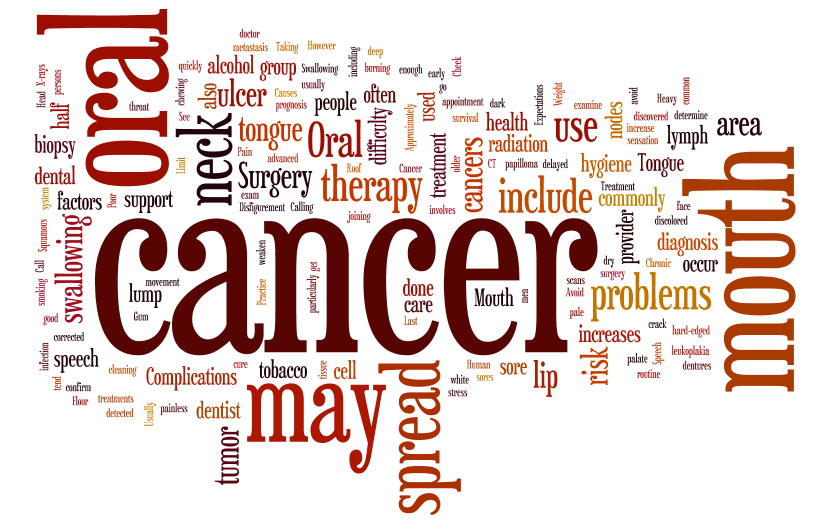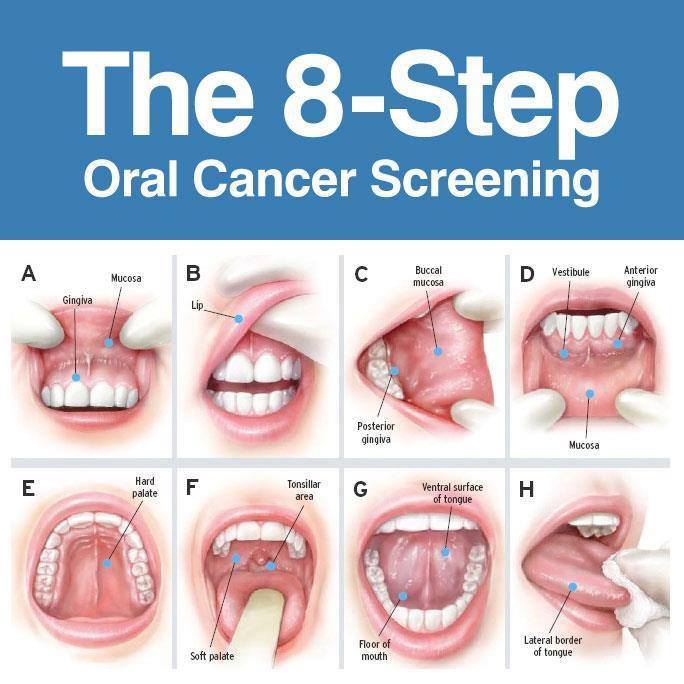by Roseman Dental | Apr 29, 2015 | Dental Clinic Blog, Oral Health, Roseman Dental - NV, Roseman Dental - UT
When you were a child, the importance of brushing and flossing your teeth on a daily basis was probably something you heard often. Almost always the focus was to keep your teeth clean to avoid cavities and the build-up of plaque, but have you ever thought that the effects of bad oral hygiene could lead to something as serious as oral cancer?
Oral Hygiene and Cancer
The American Journal of Epidemiology published a 2007 study linking neglected mouth hygiene, to head, neck and oral cancers. Researchers have found that over 3,400 U.S. adults who ranked their own personal oral hygiene as “poor” to “fair” have a higher chance of acquiring an oral infection with human papillomavirus (HPV). The U.S. Centers for Disease Control and Prevention state that approximately 12,000 cases of oral cancer occur in the U.S. each year. The presence of HPV is thought to cause close to 75 percent of these cases.
Reduce Your Risks of Oral Cancer
Here are some ways to improve your oral hygiene to prevent or reduce the risk of oral cancer.
- Make it a habit to brush and floss your teeth after every meal. Participating in both brushing and flossing will remove unwanted plaque and leftover food from your teeth and gums, resulting in less decay.
- Avoid or limit the use of tobacco and alcohol products to improve your oral hygiene. Using tobacco products means you have a 27 times greater chance of being diagnosed with oral cancer over an individual who never uses tobacco.
- Visit your dentist at least twice a year, and more often if you are at high risk or the dentist recommends more frequent visits. Allowing your dentist frequent access to your mouth gives him or her many opportunities to spot any signs of oral cancer early on. Just like with any cancer, the earlier it is diagnosed the easier it is to treat.
Protect Yourself from Oral Cancer
Poor oral hygiene can lead to cavities, broken teeth, and gum disease, which can contribute to oral cancer. Following these tips can help protect you against oral cancer and all of the stress and worry that comes with this disease.
by Roseman Dental | Apr 22, 2015 | Dental Clinic Blog, Oral Health, Roseman Dental - NV, Roseman Dental - UT
What you eat can have a major effect on the health of your teeth and gums. Most people already know about things to avoid, such as coffee and tea that can stain your teeth, or sugar foods that feed bacteria in the mouth. But what about foods that actually help your mouth remain healthy and keep teeth enamel strong? This is what you need to know about how food choices play an important role in preventing tooth decay and gum disease.
Water
Drinking plenty of water is a great way to naturally clean teeth because water can help wash away build up or particles in the mouth. Staying hydrated also ensures that your mouth is producing the saliva it needs to clean teeth and properly break down food for digestion.
Fruits and Vegetables
You may have heard people refer to apples as “nature’s toothbrushes” before, and in a way this is true of many crunchy fruits and vegetables. These foods have a high water content which helps wash away the sugars that are also contained in the food. The firm texture of many fruits and veggies also helps naturally clean tooth enamel.
Dairy
Dairy foods like milk and cheese contain calcium which helps build strong tooth enamel. The minerals in dairy foods also help the body create new layers of enamel on teeth.
Sugar and Sugar Substitutes
Sugar is one of the worst things for oral health because an accumulation of sugar in the mouth leads to a buildup of bacteria. If you have a sweet tooth that you just can’t seem to get rid of, however, there may be hope in the form of sugar substitutes. Substitute sugars like saccharin, advantame and aspartame are thought to be safe for oral health because they generally do not produce the same acids that cause decay as regular, naturally-occurring sugars do.
Eating right most of the time doesn’t just help keep your mouth healthy, it also helps promote good health overall.
by Roseman Dental | Apr 15, 2015 | Dental Clinic Blog, Oral Health, Roseman Dental - NV, Roseman Dental - UT
There are so many different types of oral care professionals out there, so trying to figure out what type of professional to see for a specific oral issue can be challenging. Many dental patients find themselves especially confused regarding the work that prosthodontists do. Unlike other dental professionals that often perform a wide variety of dental treatments, prosthodontists are highly specialized in teeth restoration and aesthetic improvement.
Here are the top five reasons why you should consider making an appointment with a prosthodontist:
1. Missing Teeth
Teeth can fall out for any number of reasons, including sports accidents, periodontal disease and old age. Prosthodontists are experts at tooth replacement and can offer a variety of solutions for missing teeth, including:
- Implants
- Bridges
- Full dentures
- Partial dentures
If you are currently missing one or multiple teeth, you should schedule an appointment with a prosthodontist and find out what it will take to restore your smile to its original beauty.
2. Complicated Aesthetic Needs
When you need intricate teeth restoration procedures due to worn or damaged teeth, you may want to seek advice from a prosthodontist. While other oral professionals may be able to help solve simple aesthetic problems, a prosthodontist has the tools and the skills necessary to perform more intricate procedures.
3. Congenital Oral Conditions
An experienced prosthodontist can offer extensive facial reconstruction for congenital oral conditions such as cleft palate and other issues that affect the function and appearance of the mouth.
4. Correction of Jaw Problems
Certain jaw joint problems may be corrected with the help of a prosthodontist. TMJ, TMD and other issues may require corrective procedures that only prosthodontists are able to perform.
5. Complete Oral Reconstruction
In some cases, complete oral reconstruction may be required in order to improve both the appearance and function of your smile. Although uncommon, oral reconstruction may be needed after oral cancer treatments or traumatic facial injuries.
If you would like to improve the appearance and functionality of your smile, try scheduling a consultation with a prosthodontist and find out what treatment options they recommend for you.

by Roseman Dental | Apr 15, 2015 | Dental Clinic Blog
Students at Roseman University’s College of Dental Medicine recently hosted the second annual Oral Cancer Awareness Run/Walk in Utah to highlight the importance of oral cancer screenings and prevention.
 There are about 43,000 new diagnoses for oral or pharyngeal cancer in the U.S. every year, and about 8,000 people will die from these diseases annually. Oral cancer five-year survival rates are only at 57 percent, which is markedly lower than survival rates for diseases like breast cancer (85 percent) or prostate cancer (close to 100 percent). Despite significant advances in cancer treatments and therapies, the five-year survival rate for oral cancer has remained the same for decades because many people do not discover the cancer until very late in the development, when it has metastasized to another area of the body (often the lymph nodes in the neck).
There are about 43,000 new diagnoses for oral or pharyngeal cancer in the U.S. every year, and about 8,000 people will die from these diseases annually. Oral cancer five-year survival rates are only at 57 percent, which is markedly lower than survival rates for diseases like breast cancer (85 percent) or prostate cancer (close to 100 percent). Despite significant advances in cancer treatments and therapies, the five-year survival rate for oral cancer has remained the same for decades because many people do not discover the cancer until very late in the development, when it has metastasized to another area of the body (often the lymph nodes in the neck).
Risk Factors for Oral Cancer
It’s important to understand the risk factors for oral cancer so you know whether you should visit a dentist for an oral cancer screening. The most common risk factors for developing oral cancers include:
- Age – individuals over 40 are at a higher risk of developing this disease.
- Smoking or using smokeless tobacco – smokeless tobacco is not a safer alternative to smoking, and both put you at risk for oral cancer.
- Excessive alcohol consumption – this risk is increased for individuals who combine heavy alcohol consumption with tobacco use.
- Frequent or prolonged exposure to sun without proper protection – this can lead to cancers in the lip area, although these are declining with the increased awareness of the dangers of ultraviolet rays.
- Previous diagnosis of oral cancer or other cancers.
In recent years doctors have seen an increase in the number of younger people diagnosed with the disease, and research has revealed it is likely due to human papilloma virus number 16 (HPV16), a disease transmitted through sexual contact. Getting oral cancer from HPV16 is particularly dangerous because it often affects the back of the mouth, such as oropharynx, tonsils, or the back of the tongue, and doesn’t produce some of the same telltale signs of disease (visible lesions, discoloration) that can lead to early diagnosis.
Getting Screened for the Disease
Part of the danger with oral cancer is that there are not a lot of really obvious signs of the disease in its early stages. The best way to lower your risk is to visit your dentist regularly for cleanings and check-ups, at the recommended six-month intervals. Dentists can often see some of the early changes in the tissues in your mouth, or even feel the tumor while it is still very small.
Some other signs of oral cancer include a white or red patch of tissue in the mouth, a canker sore that doesn’t heal after more than two weeks, or unexplained and persistent bleeding in the mouth. If you can feel an obvious lump or bump, you have difficulty swallowing, a persistent earache on one side, or hoarseness that doesn’t heal for a long time, it’s a good idea to have these things checked by your dentist. Often the dentist will order a biopsy of suspicious-looking areas to determine for sure whether it is cancer.
Treating Oral Cancer
Treatment for oral cancer may involve a mix of surgery, radiation, and chemotherapy depending on the stage at diagnosis. These methods are most effective when you can catch the cancer early.
If you have not been screened recently for oral cancer and you have some warning signs or risk factors, it’s important to see a dentist right away. The Dental Clinic at Roseman University offers an affordable option for dental care if you don’t have a dentist or don’t have dental insurance. Early diagnosis and treatment offer the best chance for survival when it comes to oral cancer.


